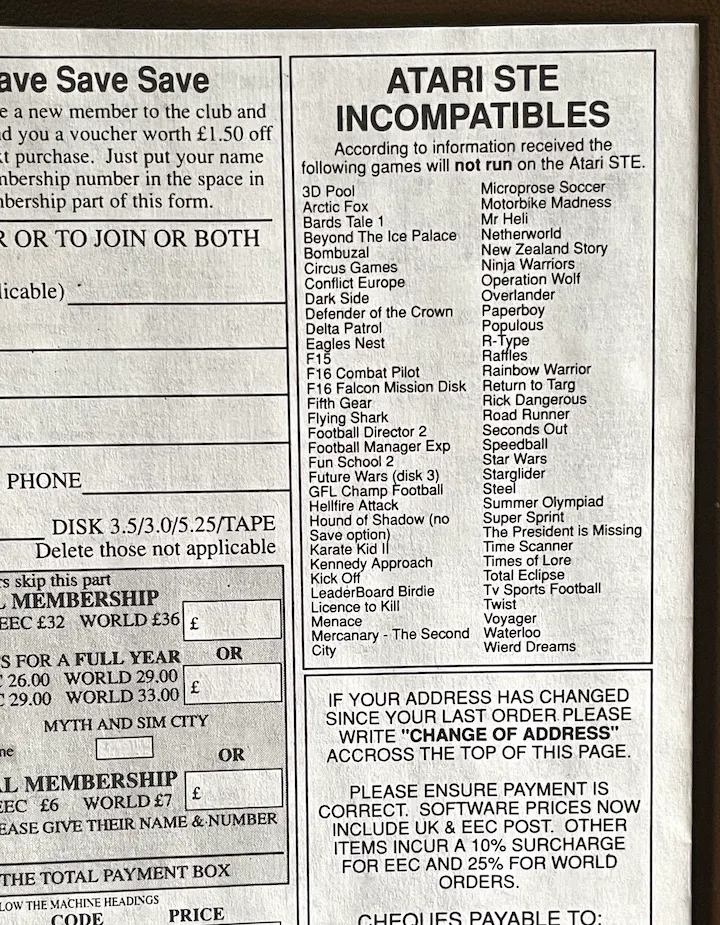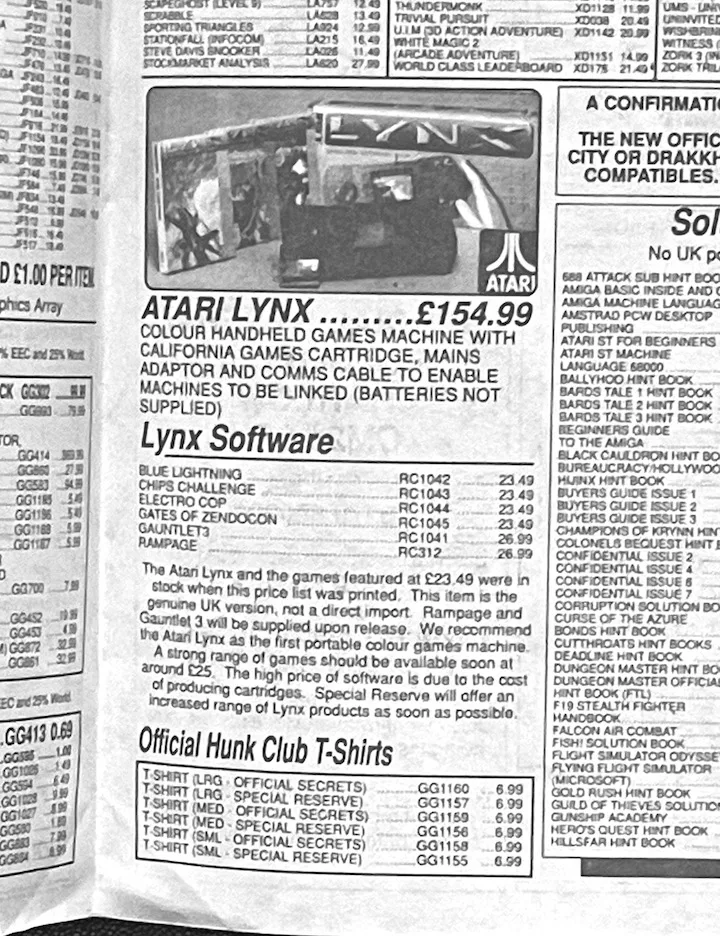Friendly Neighborhood Spider-Man!
For all those who love to read the rubbish I post here, you might remember this article: "
5 Random Atari ST Games". I really enjoyed doing that and was mightily impressed with Spiderman because I loved the saboteur element as I sneakily explored each location. That concept transformed what I expected to be a tacky platformer into something quite different. So, you've guessed it, I figured it was time that I tried this "platformer" again and hopefully dig a little deeper into it.
The Amazing Spider-Man was released in
1990 by Empire Software and programmed by John Wood of Oxford Digital Enterprises - the same guy responsible for one of the quirkiest adventures,
Sleeping Gods Lie. This game used an alternative style which felt open-world but isn't really - just bring a bad of pebbles as it's definitely worth playing!
Getting back on topic, this is an intriguing platformer taking place within a hostile Hollywood world and each stage is split into separate movie sets. This makes for a great place to chase the dreaded Mysterio who has kidnapped Spidey's girlfriend, Mary Jane. That means only one thing, it's time to mask up and save the day. And get the girl, of course.
Before the game starts, we are treated to a fantastic comic strip representation of the realistic storyline...

 This is a great intro and the series of images only goes to prove two things:
This is a great intro and the series of images only goes to prove two things:
One, gingers are some of the sexiest women alive. Two, not so much for the men!
Let's Marvel
Unlike most platformers, this one feels very different from the go. Visually, it's more like an older 8-bit platformer using smaller sprites and that's something I like because too many ST games went big and thus felt clunky (ala 9 Lives). However, controlling Spidey surprised me because the ST's joystick was never meant to do much beyond its basic single firing and 4-directions. So I was curious how Spidey was going to scale walls and ceilings like I had imagined.
Well, I love the joystick controls as they are unique and incredibly well-thought-out. Of course, he can walk left/right but, when coming into contact with a wall, move the joystick as if you were following the shape of that. Same for the ceilings, but hanging upside down is weird - as pushing upwards will crouch and pulling down allows him to stand. I think I've made the controls sound rather awkward but they're not. Tough to explain but actually fun to play.
Of course, we wouldn't be Spiderman if we weren't able to shoot sticky webs out from our wrists. It's dead easy to do but also an integral part of the game - just hit the fire button whilst also choosing from eight directions using the stick. There is an unlimited supply of his goo which we use to stun enemies, hit switches, and swing just like Pitfall Harry!
Many subtle Hollywood references are used throughout and here is Godzilla at the top of a Manhattan skyscraper...
 These are two of my favourite screens because of their excellent mechanics.
These are two of my favourite screens because of their excellent mechanics.
Note the slippy wall parts leading to the dinosaur! Can you also see the exit up there?
Playing in DC World
The Amazing Spider Man isn't really that complex of a platformer, to be honest. Each room is a part of the larger puzzle using basic puzzle elements to work out your route through to Mysterio who is hiding in the executive offices of Rockwell Film Studios. This is a labyrinth with many pathways blocked either by an obstacle or something else so it won't be easy. To get by every so-called puzzle, we must source the switch and hit it with our webs (or walk over it). However, some areas are quite tough and may require a series of switches to hit in order but, that's about as complex as it gets.
Mysterio isn't daft and the environment is riddled with different traps that force Spidey to use his cunning and special abilities. For example, laser beams, fire, greased walls, and electrified water will mean crawling along other surfaces to safely pass. However, the madman also has many henchmen like robots, mummies, and rats so our arachnid powers are needed to fire webs. That isn't deadly, stunning for only a short period, but it's enough to execute any tactical plans!
A giant image of SpiderMan is located on the right side of the screen to represent energy levels. As they deplete, his flesh will strip away from his bones - Atic Atac style! Getting worried about that? Then look out for Clapperboard rooms.
It's time for a screenshot and here is the opening room where we can safely experiment with the controls...
The screen information is a bit pointless - at the top is your score with a bar that indicates progress through the current stage. That heart beats faster the more you are hurt but, tbh, none of this matters much. Just keep your eyes on the massive Spider-Man figure which depicts our energy levels. The more it turns into a skeleton the closer you are to death!
Graphics
I was quite surprised to discover Deathbringer artists Colin Swinbourne and Kevin Ayre are responsible for the visuals. That game wasn't great but it was a visual feast with large sprites, colourful landscapes and parallax scrolling. In fact, it was quite the showcase product even though I wondered how much better it might have been on the Atari STe. Ah well...
Anyhow, this game is basically the complete opposite with static screens, a reduced gameplay window, intricate designs, and a style reminiscent of older 8-bit platformers in many respects. However, it's the sprite animations that make this game very special as Peter Parker's movements are nothing less than exceptional for all his actions.
Hey, do you want a zippy-zappy laserbeam screenshot with a room of near-impossible-to-beat danger? You got it...
I love how integrated each room is and these two follow on perfectly.
Find a way to bypass the mummy but the next screen is very tough. Do you see all the switches?
Audio
Sadly, the audio fairs less than the gorgeous visuals I thought. The title screen music is fine but there is little else with only a few spot effects used in-game for actions like firing our webs. Impressively, they didn't wimp out and used quality samples that worked well and I loved hearing the distant Mysterio laughing. It's pointless but I enjoy additions like that!
Sadly, it's not all good because whoever made the effects obviously has a sinister streak deep within their soul. Try walking over something dangerous or touching a baddy and you will hear an eardrum-bursting noise - extremely irritating!
Okay, here's the final run of screenshots from the dreaded sewer screens! Ugh, use that clapperboard...
 What were they thinking? This is the most frustrating room in the entire game!!
What were they thinking? This is the most frustrating room in the entire game!!

These rooms not only offer access to later stages but are also handy for replenishing energy.
The CryptO'pinion?
This game is all about being sneaky and I love that aspect. Getting around is interesting and enjoyable but the real challenge comes from your own careful exploration as a saboteur. Laying in hiding, waiting, knowing when to stun enemies to avoid contact in order to make a safe pass. It's invigorating and makes this a game I wholeheartedly recommend.
However, there are some rooms that are terrible in design and frustrated me no end: the sewer regions! This is actually a tiny part of the entire game but it took me ages to beat and I didn't enjoy a single second of it. In fact, it's not overly challenging, it's badly designed with too many environmental hazards, enemies and stupid switches.
So, the game ain't perfect but what is? Well, there's much to like and I feel positive about the perfect controls, interesting environments, and stunning animations. However, it's being a sneaky saboteur who silently and tactically explores each location. That is something I find exciting especially as I can't think of another Atari ST game quite like this.
Scroll down a little more to view the completed map (click the image).
 This is the opening level fully mapped. It might look small but this was challenging to finish!!
This is the opening level fully mapped. It might look small but this was challenging to finish!!
[ Clicking on it shall download the glorious high-resolution version ]






















































